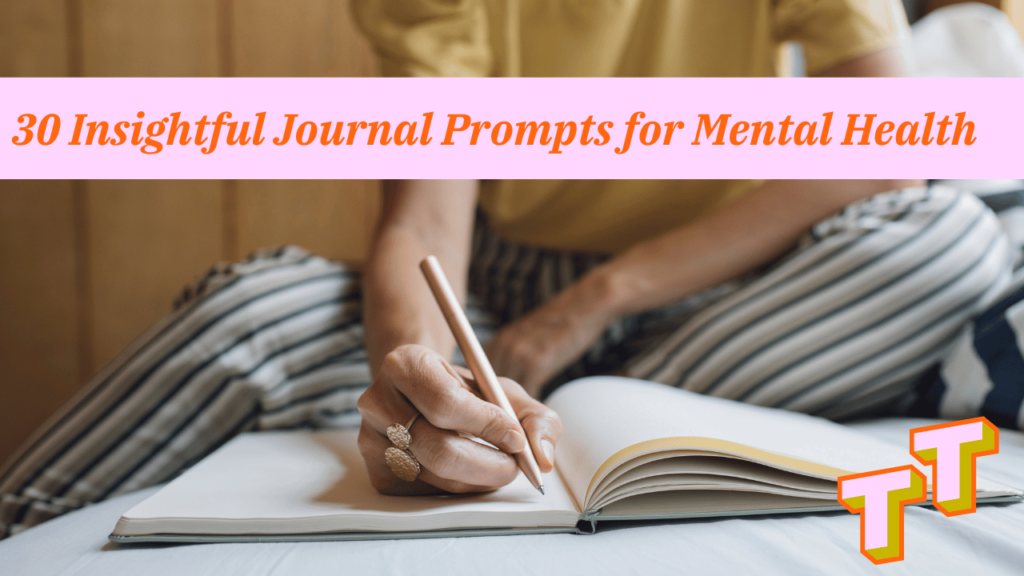
There is a lot of buzz these days about the importance of journaling for mental health. It seems like almost everyone has a story to share about how using journal prompts for mental health has helped them through a tough time or healed an old wound. And while it’s always nice to hear personal stories, what does the research say about the benefits of journaling for mental health?
Turns out, there’s a lot of evidence that supports the use of journaling for mental health. In fact, journaling has been shown to have many benefits, including reducing stress and anxiety, improving mood, increasing self-awareness, and helping people process difficult emotions.
But why does journaling work so well? What is it about writing down our thoughts and feelings that makes such a big difference in our mental health?
There are probably several reasons why journaling is so beneficial for mental health. For one thing, writing can be very cathartic. It can help us release pent-up emotions and feelings that we might not otherwise be able to express. Journaling also lets us get our thoughts and feelings out in the open, where we can see them more clearly and objectively. This can help us gain insight into our own behavior and how we might be able to make positive changes.
But journaling isn’t just about writing down our feelings and thoughts. It can also be an effective tool for problem-solving, goal-setting, and creative thinking. By journaling about our dreams, goals, and ambitions, we can gain clarity on what matters most to us and develop plans for achieving those things.
If you’ve wanted to try journaling but aren’t sure where to begin, we’ve got you covered!
30 journal prompts for mental health that may help get you started:
- What are you avoiding right now? Write for 5 minutes about it.
- What coping mechanisms did you use to deal with difficulty in the past? Are those coping mechanisms still working for you?
- When you’re angry, how do you express your anger? What does it feel like? Use as descriptive, non-obvious words as you can. Don’t use the word “mad” or “angry.”
- What was your relationship with your parents like?
- Do you have any unresolved issues from previous relationships that are affecting your current relationships?
- How do you feel when you have conflict in your relationships? What do you do? How do you act?
- What are your specific needs in a relationship? Think about familial relationships, romantic relationships, and friendships.
- What are some things that usually motivate you?
- What are some things that you’re struggling to be motivated about?
- What are some things you can do to increase your motivation?
- Make a list of things that make you *feel* something. Keep listing until you can’t think of anything else.
- Write about a time when you felt really proud of yourself. What made you so proud? Write the most visceral account of that time. What happened, what you felt, etc.
- Write about a time when you felt most distinctly like yourself. Has there been an instance or a period of time where you really felt at home in yourself?
- Make a list of your strengths. Keep going until you can’t think of anything else you’re terrific at.
- Describe your favorite time of year. What makes it your favorite? How do you feel?
- Write about a time when you felt supported by others. What did it feel like to know others were in your corner? Did you ask for the support, or did they just come alongside you without you asking? How easy is it for you to ask for support?
- Make a list of people you can contact for support, just in case you ever need it.
- Write a little bit about your perfect day. This doesn’t have to have happened in real life, but if you could design the best day of your life…what would it include? How would it feel? Who would you spend it with?
- Find five quotes that inspire you, comfort you, or motivate you. Write those down.
- Write a letter to your 10-year-old self. What would you say?
- What is one tiny moment from today that stuck out to you? Write as much as you can about it, down to the tiny details that were interesting.
- What are three things you wish people knew about you but few do? Why do you think those things aren’t apparent to people? Is there anyone you could share these things with?
- Write about a time you really messed up. What did you learn? If you encountered the same situation again, what would you do differently?
- When do you feel most fulfilled and content? Write for 5 minutes about everything you can about those times.
- If you could change ONE thing about yourself, what would you change? Why? How would that change your day-to-day life?
- What are two things you’ve done well lately?
- Think of the teacher who had the most impact on your life. Write a letter of thanks to them.
- What would make tomorrow a great day? What would the things that would make the day great make you feel like? What are two things you can do today to set yourself up for tomorrow to be a great day and ensure you feel amazing?
- What is your 3-year plan? Where do you want to end up by then? What do you want to be true in your life? What are your goals? List out five goals and then three steps you can take in the next month to move you closer to each of those goals. Go easy on yourself here. It matters less that these are the perfect goals than that you’re using your brain to think ahead.
- What’s keeping you back from the things you want and need in your life? What’s standing in the way of achieving your goals or fulfilling your desires? Make a list of the hurdles and stumbling blocks keeping you from your best life. Then, match each hurdle with a way you could hop over it.

How do journal prompts for mental health help with anxiety and depression?
Journaling can be an effective tool in managing feelings of anxiety and depression. It can help to process thoughts, feelings, and behaviors in a healthy way. Journaling allows you to take control of your emotions without the aid of medications or other treatments (although, yay for the option of better living through chemistry if needed!). Studies have shown journaling regularly helps reduce symptoms of anxiety and depression while also increasing self-awareness, self-esteem, and overall well-being. Additionally, journaling provides a safe space for writing that is separate from our daily lives, allowing us to free ourselves from distractions and focus inwardly on what we are feeling.
When journaling for mental health purposes, it’s vital to find journal prompts that will allow us to delve into our emotions and beliefs honestly. Journaling doesn’t do its job if you’re writing surface-level stuff or if you’re polishing up your answers to sound better.
Additionally, journaling allows people to track their progress over time, providing concrete evidence that they are making positive changes in their lives. When done regularly, journaling can provide a sense of structure and organization to one’s life, which may be helpful for those with anxiety.

Download this cheat sheet to optimize underperforming posts on your website.
How does journaling for mental health help with trauma?
Trauma can be a very difficult experience to overcome. For many people, the trauma they have experienced affects their day-to-day life. This is where journaling comes in. Journaling can help people work through their trauma by giving them a safe and private space to express their feelings. It can also help them process the events that have happened to them and understand them better.
Studies have found that if you keep up a regular practice of journaling, it can help reduce symptoms of PTSD. It’s also been found that writing a lengthy entry about the traumatic episode can help mitigate the effects of that trauma.
——
Journaling can be an extremely beneficial activity for those struggling with mental health issues, trauma, and more. The prompts listed in this blog post are a great place to start when looking for journaling ideas that will help you explore your thoughts and feelings. If you find that journaling helps manage your symptoms or allows you to process difficult experiences, be sure to keep it up! Journaling can be a powerful tool in helping us heal from our past and move forward toward a brighter future.
